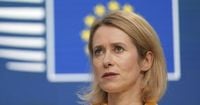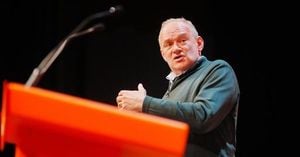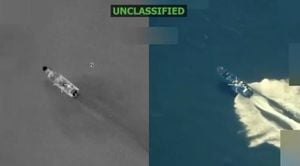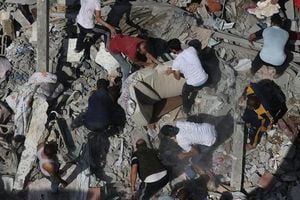In a significant diplomatic escalation, Vyacheslav Volodin, the president of the Russian Duma, has called for the removal of EU High Representative Kaja Kallas following her recent comments regarding the upcoming Victory Day celebrations in Moscow. Volodin's request, made on April 15, 2025, via Telegram, comes after Kallas advised EU candidate countries to abstain from attending the May 9 parade, which commemorates the Soviet victory in World War II, referred to in Russia as the "Great Patriotic War."
Volodin accused Kallas of "Russophobia" and disrespecting the memory of those who sacrificed their lives to defeat Nazism. He stated, "Kallas should be removed from her post and brought before an international United Nations tribunal." This strong reaction underscores the heightened tensions between Russia and the European Union, particularly in the context of ongoing conflicts and diplomatic disputes.
In his statement, Volodin emphasized the historical significance of the May 9 celebrations, noting that 27 million Soviet lives were lost during World War II, alongside over 800,000 from the United States and the United Kingdom. He expressed that Kallas's remarks were an affront to the memory of these sacrifices, insisting that such disrespect could not be overlooked. "A world saved by the multinational Soviet people must never be forgotten," he declared.
Volodin's comments reflect a broader sentiment within Russia regarding the importance of commemorating the sacrifices made during the war. He pointed out that Russia has laws against the rehabilitation of Nazism, suggesting that Kallas's comments could be interpreted as a violation of these laws. "Our duty is to defend those who saved the world from fascism," he concluded.
The diplomatic fallout from Kallas's statement was compounded by the context of recent military escalations. Only days before Volodin's comments, reports surfaced from the Russian embassy in Italy, which accused the Italian political and media establishments of obstructing peace efforts and fueling anti-Russian sentiments. The embassy specifically targeted journalist Stefania Battistini for allegedly participating in a Ukrainian military operation that resulted in civilian casualties in Russia.
Amid these tensions, the European Union is preparing to increase sanctions against Russia. EU foreign ministers, meeting in Luxembourg, cited recent Russian missile attacks on Sumy as a primary reason for the intensified sanctions. The ministers expressed their commitment to responding firmly to Russian aggression, which they view as a significant threat to regional stability.
In a related context, U.S. Vice President JD Vance criticized Ukrainian President Volodymyr Zelensky for suggesting that the U.S. is aligned with Russia. Vance's remarks, made during an interview with UnHerd, highlighted the complexities of U.S.-European relations, particularly regarding defense responsibilities. He stated, "Europe cannot continue to depend permanently on the United States for its security," reinforcing a longstanding call for European nations to take greater responsibility for their defense.
Furthermore, Vance's comments come at a time when discussions about a potential peace agreement between Russia and Ukraine are gaining traction. Steve Witkoff, a special envoy from the U.S., indicated that President Vladimir Putin is open to a "permanent peace" agreement, following a productive meeting in St. Petersburg. Witkoff noted that achieving lasting peace would involve more than just a ceasefire, hinting at broader negotiations that could reshape U.S.-Russian relations.
As the situation continues to evolve, the international community remains on high alert. The potential for further military engagements and the implications of diplomatic statements are closely monitored by global leaders. The rhetoric surrounding Kallas's comments and the responses from Russian officials highlight the fragile state of relations between Russia and the West, particularly as the anniversary of Victory Day approaches.
In conclusion, the call for Kaja Kallas's removal by Vyacheslav Volodin signifies a dramatic escalation in the ongoing diplomatic tensions between Russia and the European Union. As both sides prepare for the May 9 celebrations, the implications of these statements will likely reverberate through international relations in the coming weeks.









